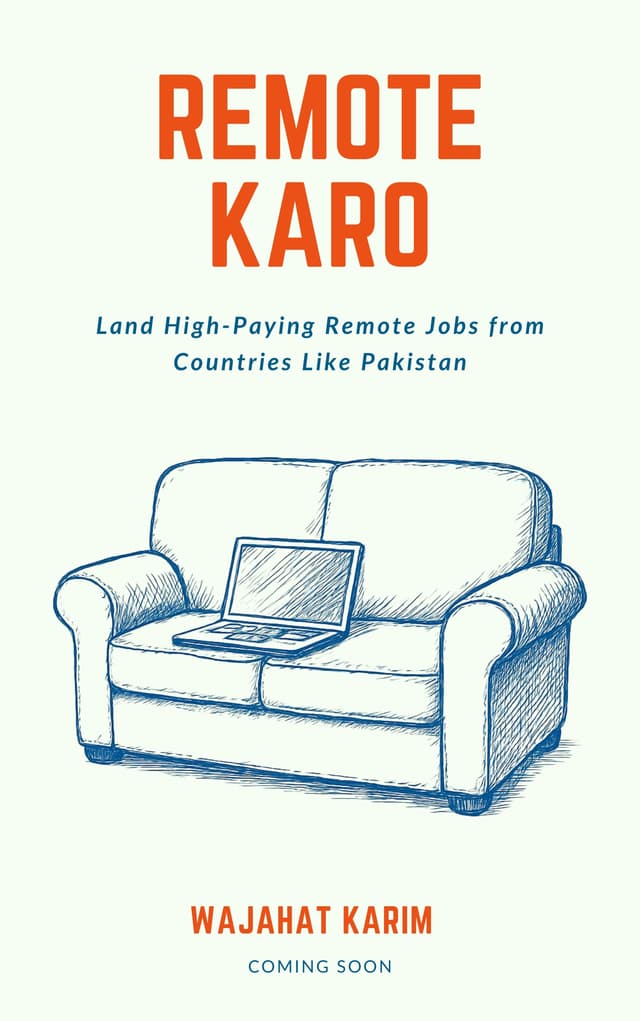Coming in 2026
Land a High-Paying Remote Job from Pakistan.
No "believe in yourself" BS. No productivity hacks. Just the actual lessons from 1,237 real job rejections.
Join 400+ developers on the waitlist. No spam.

What's Inside
The ATS Resume System
Beat the 97% rejection rate before a human ever reads your CV. Mirror Method, Synonym Stacking, 23 Remote Signals.
Pakistan Salary Reality
$1,200–2,000 starting USD. What Buffer, GitLab, and Doist actually pay — and the geographic arbitrage math.
The Referral-First Strategy
Why applying cold is mostly wasted effort in 2026, and how to get to the front of the line instead.
LinkedIn & Portfolio That Gets Noticed
Optimize your LinkedIn to attract inbound leads. Build a free portfolio in under 10 minutes using AI and open source tools.
Cover Letter & Email Pitch Formula
The 3-paragraph formula that gets replies. Direct email strategy to find HR emails without paywalled tools.
Company Validation System
The 5-Minute Filter to spot red flags before you waste time on a ghost company or a bait-and-switch role.
Technical Tests & Take-Home Tasks
A realistic LeetCode strategy for working developers. How over-delivering on take-home tasks wins offers from competitive pipelines.
Remote Interview Playbook
Interview types — HR call, tech domain, tech non-domain, culture fit, CEO. What each tests and how to pass these.
Offer Negotiation & Geographic Arbitrage
The Door-in-the-Face technique. What Pakistani developers leave on the table by saying yes too fast.
90-Day Action Plan
Week-by-week executable plan. Start Month 1 the day you finish reading — no setup required.
What Alumni Say
400+ Developers. Real Results.
From RemoteKaro masterclass alumni across Pakistan.
“Offer agyi hai — 100k a year. Ap k baghair nahi hosakta tha. Thank you so much for this.”
Workshop Attendee
RemoteKaro Masterclass
“An outstanding 2-day RemoteKaro session. The training was incredibly insightful, practical, and thoughtfully structured.”
Haris Ahmed
RemoteKaro Masterclass
“Exceptionally engaging with comprehensive insights into successful application strategies and interview techniques.”
Muhammad Talha Khan
RemoteKaro Masterclass
“I loved how Wajahat Karim used his remote knowledge to build this whole course. Loved the mock interviews — they were really eye opening.”
Salman Khwaja
RemoteKaro Masterclass
“The session was incredibly informative and engaging. Your approach is unique and inspiring and I'm excited to use these tools.”
Ammara Dawood
RemoteKaro Masterclass
“An excellent masterclass. The conversational delivery style made it much more engaging than a traditional slide presentation.”
Muhammad Anas
RemoteKaro Masterclass
“It was great how all the questions were answered and more. The value was there and it was an amazing session throughout.”
Muhammad Basim
RemoteKaro Masterclass
“The remote job masterclass is extremely helpful. It is like a step-by-step guide to find, apply, and get a good remote job.”
Workshop Attendee
RemoteKaro Masterclass
“Very helpful with realistic insights into the remote job market by somebody who's been through it all.”
Workshop Attendee
RemoteKaro Masterclass
“Bohatttttt hi zyada informative session tha and I felt this thing k mera way of applying to a job is pretty wrong.”
Workshop Attendee
RemoteKaro Masterclass
“I'm an extremely introverted person and never attended any session before. But this session gave me a boost to become social.”
Workshop Attendee
RemoteKaro Masterclass
“I absolutely loved your session — your energy, ability to entertain every single query, mock interview demo, resume and LinkedIn grooming tips.”
Workshop Attendee
RemoteKaro Masterclass
About the Author

Wajahat Karim
Google Developer Expert · Android · Remote since 2017
Wajahat Karim is a professional Android developer, author of 2 worldwide published books, and Pakistan's first Google Developers Expert (GDE) in Android. He has been doing remote jobs since 2017 and has been helping developers around Pakistan land remote jobs through talks, university sessions, and 4-hour masterclasses.
He has conducted his 1:1 masterclass more than 100 times and done group sessions that have trained over 400 developers on how to build a great resume, ace interviews, find the right places to apply, and land a remote job.
He was also offered a job at Facebook London as a mobile engineer — but he preferred remote work and didn't leave Pakistan. This book is everything he has learned practically, especially from getting rejected more than 1,200 times.